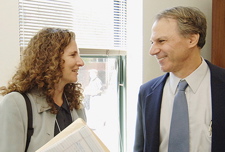Katrina aftermath echoes 1927 Mississippi, says visiting author
Demand for flood relief set stage for New Deal era

This story was published on BU Today October 3, 2005.
In 1927, a natural disaster in Mississippi changed the way Americans thought about their government. Will Hurricane Katrina ultimately have the same effect? The answer, says historian and author John M. Barry, is that time will tell.
Barry, a distinguished visiting scholar at Tulane University’s Center for Bioenvironmental Research, has written five books, including Rising Tide: The Great Mississippi Flood of 1927 and How It Changed America, published in 1997. That volume has brought him much media attention recently because of its parallels with this year’s devastating hurricanes, although it was his most recent work, last year’s The Great Influenza: The Epic Story of the Deadliest Plague in History, that earned him a slot as a keynote speaker at the School of Public Health’s annual William J. Bicknell Lectureship, a two-day lecture series held September 29 and 30.
Barry was living in Washington, D.C., when Hurricane Katrina flooded New Orleans, but he lends a valuable perspective to the tragedy, and he shared his thoughts with many SPH students and other Bicknell lecture attendees at a luncheon Friday afternoon.
Rising Tide tells the story of the Great Mississippi Flood and its political consequences. To prevent the rising tide from flooding New Orleans, local officials ordered levees upstream from the city to be broken to divert the water. The result was hundreds of deaths and thousands of poor black families made homeless.
“People didn’t believe that the government had any responsibility to the individual,” Barry said. After the flood, the Red Cross fed more than 650,000 residents for months. The U.S. Army lent the Red Cross kitchens and tents, later demanding payment. “The American people did not accept that,” he said. “The sea change in American political thinking that followed paved the way for the Tennessee Valley Authority and the New Deal. The Flood Control Act of 1928 was the most expensive federal project since World War I.”
This year’s lack of support for New Orleans evacuees may have a similar effect, he said, as it becomes clear that the federal government was responsible for levee construction and repair. Despite accusations that the New Orleans Levee Board is corrupt, it’s the federal government, Barry said, that designed and constructed the levees, and whether the Levee Board is “pure as snow or completely corrupt is irrelevant.”
Will the events lead to a new direction for America’s government? “To hear the words ‘legacy of oppression’ from the president’s mouth was astoundig,” Barry said, adding, “whether that will lead to deep and long-lasting change remains to be seen.”
Barry, who was trained as an historian, was a journalist for 10 years before becoming an author.